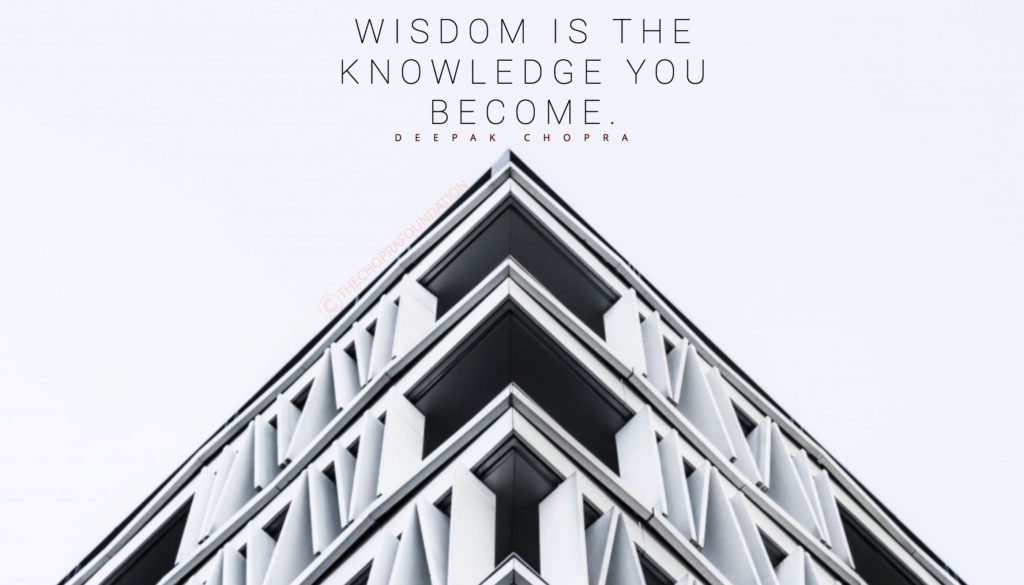By Deepak Chopra, MD
There will never be a book titled Wisdom for Dummies, which would be a self-contradiction, but there will never be Wisdom for Really Smart People, either. That’s because wisdom cannot be turned into a fixed system and taught. In a devalued way, wisdom can be transmitted as experience or lessons from a mentor to a student or apprentice. But Socrates made it his mission to oppose the Sophists, a school of teachers in Athens who founded their philosophy on teaching wisdom to others. Socrates held the contrary idea that to “know thyself” wasn’t possible without going deeply into the mysterious workings of truth, which is accessible beyond words and therefore beyond teaching.
In India, the same notion was carried even further. Speaking of the self and the reality it belongs to, the ancient rishis declared “Those who know it speak of it not. Those who speak of it know it not.” By taking wisdom totally away from the field of things we rely upon every day—information, news, opinions, private beliefs, assumptions, experience, memory, and education—the world’s wisdom traditions pose the ultimate challenge. This helps to account for why, in our information—and disinformation—age, wisdom isn’t a goal many people pursue. So much can be achieved without it, simply relying upon the very things that Socrates and the ancient rishis ignored.
The best incentive, I think, for promoting wisdom is to clothe it as something very desirable: waking up. The two actually are the same. They involve a shift in consciousness. The only way to know if you are waking up, or perhaps have already woken up, is to feel the contrast with being asleep. “Asleep” is a metaphor for a state of consciousness that brings unwanted pain and suffering, that constantly finds itself in confusion and conflict, that brings doubts about life’s uncertainty over which looms the fear of death. If waking up can end those ills, then wisdom justifies itself.
Wisdom can’t be taught and by the same token can’t be learned. Instead, it’s the kind of knowledge you become. Or in everyday modern language, wisdom is a stage of development, not brought about the way genes direct childhood development, but as a choice to consciously evolve. Being a conscious process, or what spiritual seekers call a path, wisdom does have guidelines and principles. There are various ways you can cooperate with the evolutionary process, the way putting a book before a young child can encourage the innate ability to read.
In that light, here are 20 principles I sketched in some years ago, with hopes of centering a book around them. I recently ran across them again and offer the list without commentary. The purpose is simply to show how I guided myself with the goal of waking up. How you use the list is up to you. It may give you some sense of where you are or want to be. It may remind you of things you’ve already realized but let slip. In any case, I want to reinforce a belief in wisdom that has endured for centuries and continues to survive, even in times where skepticism, materialism, and uncertainty tends to be the norm.
- Always think unlimited possibilities. Infinity exists in all directions.
- Choose consciously, each and every time.
- Pay attention to the timeless core of your being.
- Nurture the richness of your inner life. Daydream, imagine, and reflect. It’s the source of infinite creativity.
- Know that everything is connected to everything else.
- Instead of asking “What’s the problem? “ask “What’s the opportunity to evolve?”
- Understand Karma: No debt in the universe goes unpaid.
- Your only identity is I am, undefined and infinite. Any label you give yourself limits you.
- The invisible and subtle gives rise to the visible and material.
- Be comfortable with and embrace paradox, contradiction. and ambiguity. Uncertainty is the womb of creativity.
- Consciousness regulates and becomes the flow of energy and information in your body, your relationships and your world.
- The most effective way to transform into higher consciousness is to pay attention in the present moment.
- Our most natural state is joy. It is the foundation for love, compassion, healing, and the desire to alleviate suffering.
- Be your own best friend by forgiving yourself and dropping self-judgment.
- Intuition is deep listening with the body, mind, heart, and soul.
- Know that your self cannot be squeezed into the volume of a body or the span of a lifetime.
- Emotional intelligence begins when you feel without labels or evaluation.
- Each mind is entangled with all minds past, present, and future through the exchange of meaning.
- Ultimately your reality is rooted in your own source. Take responsibility for it at every level.
- No matter what the situation is, remind yourself “I have a choice.”
Deepak Chopra MD, FACP, founder of The Chopra Foundation and co-founder of The Chopra Center for Wellbeing, is a world-renowned pioneer in integrative medicine and personal transformation, and is Board Certified in Internal Medicine, Endocrinology and Metabolism. He is a Fellow of the American College of Physicians, Clinical Professor UCSD Medical School, researcher, Neurology and Psychiatry at Massachusetts General Hospital (MGH), and a member of the American Association of Clinical Endocrinologists. The World Post and The Huffington Post global internet survey ranked Chopra #17 influential thinker in the world and #1 in Medicine. Chopra is the author of more than 85 books translated into over 43 languages, including numerous New York Times bestsellers. His latest books are Super Genes co-authored with Rudolph Tanzi, PhD and Quantum Healing (Revised and Updated): Exploring the Frontiers of Mind/Body Medicine. www.deepakchopra.com
